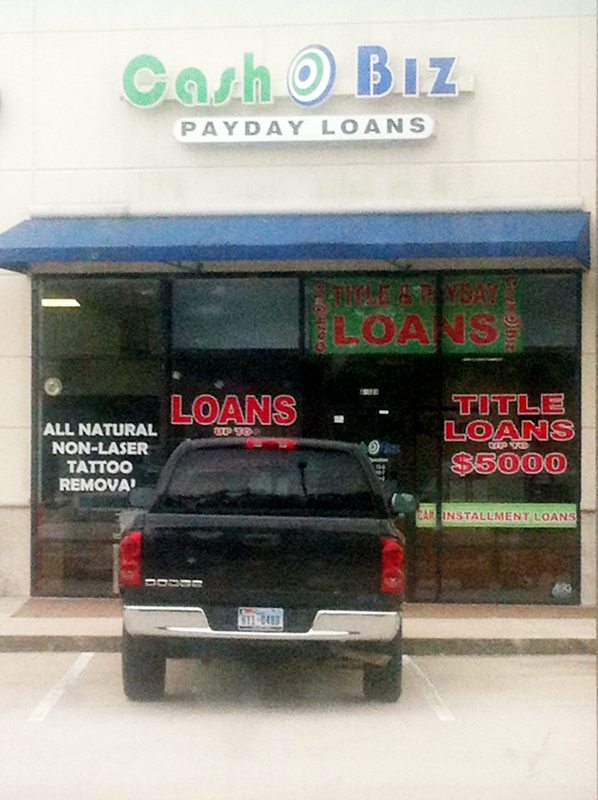
Report: Texas Payday Lenders and Prosecutors Team Up to Criminally Pursue Borrowers

In March 2012, Margaret Jones, a 71-year-old Austin great-grandmother, found herself in a financial crisis. Her husband had recently passed away, she’d lost a temporary job and she was struggling to live on a Social Security check of $1,160 each month. Jones, who asked that her real first name not be used, had moved in with her daughter but was looking for her own place. She had just enough to cover utilities, groceries, gas for her car and rent, but not enough left over for a deposit for an apartment. Cash Plus, a California-based payday loan franchise, had recently opened a location near her home in South Austin, so one day Jones went in and took out a $225 loan. In a month, she would owe Cash Plus $271.91—an effective APR of 245 percent. Jones hoped to be settled in her new place by then and have her finances in order enough to pay the loan off. But a month later, her financial situation had worsened.
The deposit on her new place was tied up. The electricity bill was much higher than expected. And she’d also taken on an auto-title loan; not keeping up with the payments would mean losing her car. She explained all this to a Cash Plus manager, who persuaded her to renew, or “roll over,” her payday loan by carrying the balance forward and paying $50 in fees.
But then the next month Jones faced the same hopeless prospect. This time she didn’t even have the cash to pay the renewal fees.
“If they couldn’t get their money one way, they’ll get it another, even if it hurts the poor. That’s what I am. I’m a poor person. And it saddens me” how many people “have become prey to such predatory lenders.”
“What I thought was going to happen was they would have some kind of sympathy for a senior who was living on a fixed income of Social Security and that they would allow me to make some kind of monthly payment.”
Instead, the manager began haranguing Jones over the phone for the full amount of $271. Jones kept asking for a payment plan. One day, he told her, “I hate to do this to you,” but didn’t explain what he was planning to do. After that she didn’t hear from him for a few weeks, until the day he called to give her a “case number” and a telephone number to call. As she would find out later, the man had filed a criminal theft by check complaint against her with a Travis County justice of the peace.
“I was just terrified to the point that I couldn’t eat, my blood pressure went up,” she said. “I was just nervous, scared.”
Jones hunkered down, waiting for something to happen. But nothing came in the mail, no threatening letters or legal notices. In February, almost two years later, she called the Department of Public Safety to see about getting her driver’s license renewed—but DPS refused. That’s how she found out that a warrant had been issued for arrest. As she later discovered with the help of a pro bono attorney, the justice of the peace court had sent her paperwork to a previous address and she’d missed a court hearing. In her absence, the judge had ordered her to pay $919 in court fees and restitution, and issued a warrant for her arrest.
Pursuing, or even threatening, criminal charges against payday and title borrowers is strictly prohibited by Texas law, with very few exceptions. The Texas Constitution unequivocally states, “No person shall ever be imprisoned for debt.”
But new research released this morning by Texas Appleseed shows that criminal charges against payday borrowers for missing payments are common in Texas. Texas Appleseed documents more than 1,500 criminal complaints of bad check and theft by check allegations filed by payday loan companies in Texas between 2012 and the spring of this year. Many of them resulted in fines, arrest warrants and even jail time.
The research builds on reporting by the Observer published in July 2013, which found 1,700 instances in which payday lenders in Texas have filed criminal complaints against customers. The Observer story prompted an ongoing investigation by the state Office of Consumer Credit Commissioner, which regulates the industry in Texas, into one payday loan business, Cash Biz. It also led regulators to issue an advisory bulletin to lenders warning them to stop pursuing criminal charges against their customers.
Texas Appleseed found 13 different payday loan companies pursuing criminal charges in eight different counties, including Travis, Dallas, Harris and Collin. Texas Appleseed filed a complaint today with the federal Consumer Financial Protection Bureau, the Federal Trade Commission, the Texas Attorney General’s Office and the state Office of Consumer Credit Commissioner. The complaint letter, which includes 700 pages of supporting documentation calls for state and federal authorities to launch an investigation and take enforcement action against lenders abusing the law and their customers.
“In addition to their outrageous rates and lending practices, payday loan businesses are illegally using the criminal justice system to coerce repayment form borrowers,” said Ann Baddour of Texas Appleseed. “This directly contravenes state and federal law, which eliminated debtor’s prisons long ago.”
In one justice of the peace court in Harris County, the group found that arrest warrants were issued in more than 42 percent of the cases and at least six people served jail time. In Collin County, there were 740 documented criminal cases against payday borrowers—636 from a single lender, PLS Loan Store—and $132,000 collected from borrowers.
“I was just terrified to the point that I couldn’t eat, my blood pressure went up. I was just nervous, scared.”
She said she fell apart. “I was scared. I cried. I kept saying, ‘Why is this happening to me?’ I was just devastated. Hurt and devastated.”
Eventually, through Texas Appleseed, Jones found a pro bono attorney who agreed to take her case. The lawyer was able to persuade the Travis County Attorney’s Office to dismiss the charges.
Jones said she thinks Cash Plus knew that she would be unable to pay from the get-go.
“If they couldn’t get their money one way,” she said, “they’ll get it another, even if it hurts the poor. That’s what I am. I’m a poor person. And it saddens me” how many people “have become prey to such predatory lenders.”
Because record-keeping is spotty and hot check cases are handled by a patchwork of hundreds of DAs, county attorneys and justices of the peace, it’s likely that the problem is more pervasive, said Deborah Fowler, deputy director of Texas Appleseed.
“We believe that the cases we documented are just the tip of the iceberg.”

